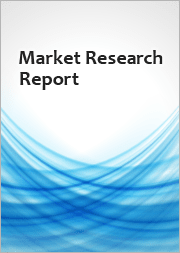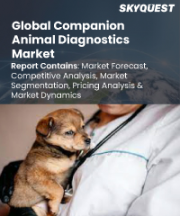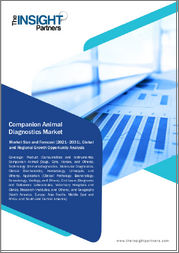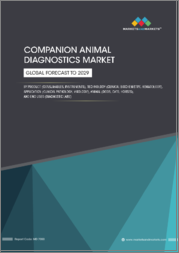
|
시장보고서
상품코드
1856796
반려동물 유전체학 및 진단 시장 예측(-2032년) : 질환 유형별, 동물 유형별, 용도별, 최종사용자별, 지역별 세계 분석Companion Animal Genomics & Diagnostics Market Forecasts to 2032 - Global Analysis By Disease Type, Animal Type, Application, End User and By Geography |
||||||
Stratistics MRC에 따르면 세계의 반려동물 유전체학·진단 시장은 2025년에 34억 달러를 차지하며 예측 기간 중 CAGR 8.8%로 성장하며, 2032년까지 62억 달러에 달할 것으로 예상되고 있습니다.
반려동물 유전체학 및 진단은 반려동물의 유전자 분석에 초점을 맞춘 수의학 분야입니다. 개, 고양이, 기타 반려동물의 DNA 염기서열을 결정하고 해석합니다. 이 분야에서는 견종 특유의 체질, 유전성 질환 소인, 고유한 유전적 특징을 파악합니다. 진단용으로는 유전성 질환의 스크리닝, 진단 확인, 질환의 근본적인 분자적 원인을 이해하는 데 이 유전 정보를 사용합니다. 이를 통해 개별 동물의 유전적 건강 프로파일을 이해할 수 있는 과학적 근거를 제공합니다.
American Veterinary Medical Association에 따르면 유전체 시퀀싱과 분자진단의 발전은 반려동물 건강관리에서 질병을 조기에 발견하고 맞춤 치료 접근법을 가능하게 하고 있습니다.
유전자 검사 기술 발전
유전학적 검사 기술의 발전은 반려동물 유전체학 및 진단 시장에 혁명을 일으켜 유전성 질환, 질병 소인, 품종 증명의 정확한 식별을 가능하게 하고 있습니다. DNA 시퀀싱, 바이오마커 분석, 바이오인포매틱스 플랫폼의 혁신을 통해 수의사와 반려동물 보호자는 개인화된 건강관리 전략을 실행할 수 있습니다. 이러한 발전은 진단 정확도를 높이고, 예방 의료를 지원하며, 조기 질병 개입을 촉진할 수 있습니다. 높은 처리량 시퀀싱, 모바일 보고, 클라우드 기반 분석의 통합으로 접근성과 사용성을 확대하여 전 세계 도시 및 지방 동물병원에서 시장 도입을 강화하고 있습니다.
높은 진단 비용과 시퀀싱 비용
반려동물 유전체학 및 진단 시장에서 높은 진단 및 시퀀싱 비용이 여전히 큰 제약 요인으로 작용하고 있으며, 비용에 민감한 반려동물 보호자들 사이에서 도입이 제한되고 있습니다. 특히 신흥 국가에서는 고가의 검사 절차, 검사실 비용, 자체 플랫폼 이용료가 접근성을 떨어뜨립니다. 이러한 경제적 장벽은 기술적 준비가 되어 있음에도 불구하고 보급에 걸림돌이 될 수 있습니다. 또한 특정 증상이나 경과 관찰을 위해 반복적으로 검사를 받으면 누적 비용이 증가합니다. 시장 기업은 지속적인 성장과 다양한 소유자 계층에 대한 광범위한 보급을 보장하기 위해 기술적 정교함과 저렴한 가격의 균형을 유지해야 합니다.
동물용 원격의료 플랫폼과 제휴
동물용 원격의료 플랫폼과의 제휴는 반려동물 유전체학 및 진단 시장에서 큰 성장 기회가 될 수 있습니다. 유전자 검사와 가상 수의학 상담을 통합하여 원격 진단, 맞춤형 치료 계획, 반려동물의 질병을 조기에 발견할 수 있습니다. 이러한 제휴를 통해 서비스 소외 지역과 지방에 대한 접근성을 확대하고, 반려동물 보호자의 편의성을 높이며, 디지털 플랫폼을 통해 반려동물 보호자의 참여를 강화할 수 있습니다. 원격의료 파트너십은 또한 정액제 유전체 모니터링을 지원하고, 지속적인 헬스케어를 촉진하며, 유전체 서비스 프로바이더의 반복적인 수입원을 촉진할 수 있습니다.
유전자 데이터베이스의 데이터 프라이버시 리스크
유전자 데이터베이스의 데이터 프라이버시 리스크는 반려동물 유전체학 및 진단 시장에 큰 위협이 될 수 있습니다. 기밀성이 높은 유전체 정보는 무단 접근, 사이버 공격, 악용에 취약할 수 있습니다. 침해는 반려동물 소유자의 기밀성을 훼손하고, 서비스 프로바이더의 신뢰를 떨어뜨리며, 규제 당국의 감시를 받을 수 있습니다. 안전한 보관, 암호화 프로토콜 유지, 국내외 데이터 보호법 준수는 매우 중요합니다. 이러한 위험을 효과적으로 관리하지 못하면 채택률에 영향을 미치고, 파트너십을 방해하며, 경쟁이 치열한 유전체 진단 분야에서 브랜드 평판을 손상시킬 수 있습니다.
COVID-19의 영향:
COVID-19는 반려동물 유전체학 및 진단 시장에 영향을 미쳐 가정내 검사 및 원격의료 서비스에 대한 수요를 가속화했습니다. 반려동물 보호자들은 병원 방문을 줄이기 위해 예방 진료와 유전자 검사를 위한 원격 솔루션을 점점 더 많이 찾고 있습니다. 연구소 업무는 디지털 보고, 비접촉식 시료채취, 택배 키트로 적응했습니다. 그러나 공급망의 혼란과 샘플 처리 지연은 일시적으로 시장 활동에 영향을 미쳤습니다. 전반적으로 팬데믹은 원격 진단 서비스 및 디지털 통합의 중요성을 강조하고 반려동물 유전체학의 장기적인 성장 전망을 강화했습니다.
예측 기간 중 감염병 분야가 가장 클 것으로 예측됩니다.
감염성 질환 부문은 반려동물 유전체학 및 진단 시장에서 상당한 점유율을 차지하고 있으며, 예측 기간 중 가장 큰 시장 점유율을 차지할 것으로 예측됩니다. 세균, 바이러스, 기생충 감염의 치료는 조기 발견, 정확한 치료, 동물 복지 향상을 가능하게 합니다. 동물병원이나 진단연구소는 감염성 질환의 유행이 많고, 종간 전파 가능성이 높기 때문에 감염성 질환의 선별검사를 우선적으로 실시합니다. 유전자 프로파일링과의 통합은 예방 전략을 강화하고 백신 접종 계획을 지원하며 표적화된 개입을 보장하기 위해 향후 수년간 이 분야가 전체 시장 매출에 큰 기여를 할 것으로 예측됩니다.
개 부문은 예측 기간 중 가장 높은 CAGR을 보일 것으로 예측됩니다.
예측 기간 중개 부문이 가장 높은 성장률을 보일 것으로 예상되며, 이는 반려견 소유자 증가, 반려동물의 인간화, 반려견의 건강 상태에 대한 인식 증가에 힘입은 것으로 분석됩니다. 개 주인들은 질병 예방, 조상 추적, 맞춤형 영양 공급을 위해 유전자 검사에 대한 투자를 늘리고 있습니다. 개 유전체학의 발전은 원격의료 도입 증가와 함께 편리하고 조기 진단 개입을 촉진할 것입니다. 개 부문은 높은 소비자 관심도와 반복 검사 가능성으로 인해 매출 성장의 중요한 동력이 되고 있으며, 선진국과 신흥 시장 모두에서 강력한 채택 추세를 반영하고 있습니다.
가장 큰 점유율을 차지하는 지역
예측 기간 중 아시아태평양이 가장 큰 시장 점유율을 차지할 것으로 예측됩니다. 이는 급속한 도시화, 반려동물 사육률 증가, 수의학에 대한 인식이 높아졌기 때문입니다. 중국, 일본, 인도와 같은 국가들은 첨단 반려동물 진단에 대한 관심이 높아지고 있습니다. 원격의료 인프라의 확대, 가처분 소득 증가, 디지털 문해력의 향상은 시장 침투를 더욱 촉진할 것입니다. 이러한 요인들이 결합되어 이 지역은 세계 시장 매출에 크게 기여하고 있으며, 도시 및 준도시 지역 모두에서 수의 진단 분야의 성장을 지원하고 있습니다.
CAGR이 가장 높은 지역:
예측 기간 중 북미는 첨단 수의학 인프라, 높은 반려동물 사육률, 유전체 기술의 강력한 도입과 관련하여 가장 높은 CAGR을 보일 것으로 예측됩니다. 미국과 캐나다는 광범위한 원격의료 플랫폼, 수의사 네트워크의 통합, 기술적 준비의 혜택을 누리고 있습니다. 예방 의료 및 개인화된 반려동물 건강 솔루션에 대한 소비자의 높은 지출이 시장 성장을 더욱 가속화하고 있습니다. 이러한 여건과 더불어, 지원적인 규제 프레임워크와 혁신적인 유전체학 기업과 함께 북미는 반려동물 유전체학 및 진단 분야에서 가장 빠르게 성장하는 지역 시장으로 자리매김하고 있습니다.
무료 커스터마이징 서비스:
이 보고서를 구독하는 고객은 다음과 같은 무료 맞춤화 옵션 중 하나를 이용할 수 있습니다.
- 기업 소개
- 추가 시장 기업의 종합적인 프로파일링(최대 3사)
- 주요 기업의 SWOT 분석(최대 3사)
- 지역 세분화
- 고객의 관심에 따른 주요 국가별 시장 추정, 예측, CAGR(주: 타당성 확인에 따라 다름)
- 경쟁사 벤치마킹
- 제품 포트폴리오, 지역적 입지, 전략적 제휴를 기반으로 한 주요 기업 벤치마킹
목차
제1장 개요
제2장 서문
- 개요
- 이해관계자
- 조사 범위
- 조사 방법
- 데이터 마이닝
- 데이터 분석
- 데이터 검증
- 조사 어프로치
- 조사 정보원
- 1차 조사 정보원
- 2차 조사 자료
- 전제조건
제3장 시장 동향 분석
- 촉진요인
- 억제요인
- 기회
- 위협
- 용도 분석
- 최종사용자 분석
- 신흥 시장
- COVID-19의 영향
제4장 Porters Five Force 분석
- 공급 기업의 교섭력
- 바이어의 교섭력
- 대체품의 위협
- 신규 진출업체의 위협
- 경쟁 기업 간 경쟁 관계
제5장 세계의 반려동물 유전체학·진단 시장 : 질환 유형별
- 감염증
- 만성질환
- 암·종양 탐지
- 유전성 질환
- 내분비 질환
- 기타 질환 유형
제6장 세계의 반려동물 유전체학·진단 시장 : 동물 유형별
- 개
- 고양이
- 말
- 기타 동물 유형
제7장 세계의 반려동물 유전체학·진단 시장 : 용도별
- 임상 병리학
- 독물학
- 세균학
- 기생충학
- 임신 검사
- 기타 용도
제8장 세계의 반려동물 유전체학·진단 시장 : 최종사용자별
- 동물병원·클리닉
- 진단 검사실
- 연구기관
- POC(Point-of-Care) 검사
- 홈케어
제9장 세계의 반려동물 유전체학·진단 시장 : 지역별
- 북미
- 미국
- 캐나다
- 멕시코
- 유럽
- 독일
- 영국
- 이탈리아
- 프랑스
- 스페인
- 기타 유럽
- 아시아태평양
- 일본
- 중국
- 인도
- 호주
- 뉴질랜드
- 한국
- 기타 아시아태평양
- 남미
- 아르헨티나
- 브라질
- 칠레
- 기타 남미
- 중동 및 아프리카
- 사우디아라비아
- 아랍에미리트
- 카타르
- 남아프리카공화국
- 기타 중동 및 아프리카
제10장 주요 발전
- 계약, 파트너십, 협업, 조인트 벤처
- 인수와 합병
- 신제품 발매
- 사업 확대
- 기타 주요 전략
제11장 기업 프로파일링
- Mars Petcare
- Embark Veterinary
- Zoetis
- IDEXX Laboratories
- Basepaws
- Neogen
- Orivet Genetic Pet Care
- Paw Print Genetics
- VetGen
- Animal Genetics Inc.
- UC Davis Veterinary Genetics Laboratory
- Genoscoper
- EasyDNA
- Heska Corporation
- Genetic Veterinary Sciences
- Virbac
- Nestle Purina
- Royal Canin
According to Stratistics MRC, the Global Companion Animal Genomics & Diagnostics Market is accounted for $3.4 billion in 2025 and is expected to reach $6.2 billion by 2032 growing at a CAGR of 8.8% during the forecast period. Companion Animal Genomics & Diagnostics is a field of veterinary science focused on the genetic analysis of pets. It involves sequencing and interpreting the DNA of dogs, cats, and other companion animals. This discipline identifies breed-specific composition, inherited disease predispositions, and unique genetic traits. Diagnostic applications use this genetic information to screen for hereditary conditions, confirm diagnoses, and understand the underlying molecular causes of diseases. It provides a scientific basis for understanding an individual animal's genetic health profile.
According to the American Veterinary Medical Association, advancements in genomic sequencing and molecular diagnostics are enabling earlier disease detection and personalized treatment approaches in companion animal healthcare.
Market Dynamics:
Driver:
Technological advancements in genetic testing
Technological advancements in genetic testing have revolutionized the Companion Animal Genomics & Diagnostics Market, enabling precise identification of hereditary conditions, disease predispositions, and breed verification. Innovations in DNA sequencing, biomarker analysis, and bioinformatics platforms allow veterinarians and pet owners to implement personalized healthcare strategies. These advancements enhance diagnostic accuracy, support preventive care, and facilitate early disease intervention. Integration of high-throughput sequencing, mobile reporting, and cloud-based analytics has expanded accessibility and usability, strengthening the market's adoption across urban and rural veterinary practices globally.
Restraint:
High diagnostic and sequencing costs
High diagnostic and sequencing costs remain a significant restraint in the Companion Animal Genomics & Diagnostics Market, limiting adoption among cost-sensitive pet owners. Expensive testing procedures, laboratory fees, and proprietary platform charges reduce accessibility, particularly in emerging economies. This financial barrier can impede widespread implementation despite technological readiness. Additionally, recurrent testing for certain conditions or follow-ups increases cumulative costs. Market players must balance technological sophistication with affordability to ensure sustained growth and broader adoption across diverse pet owner demographics.
Opportunity:
Partnerships with veterinary telehealth platforms
Partnerships with veterinary telehealth platforms present a substantial growth opportunity in the Companion Animal Genomics & Diagnostics Market. Integrating genetic testing with virtual veterinary consultations enables remote diagnostics, personalized treatment plans, and early disease detection for pets. Such collaborations expand reach to underserved or rural areas, increase convenience for pet owners, and enhance engagement through digital platforms. Telehealth partnerships can also support subscription-based genomic monitoring, promoting continuous health management and driving recurring revenue streams for genomics service providers.
Threat:
Data privacy risks in genetic databases
Data privacy risks in genetic databases pose a notable threat to the Companion Animal Genomics & Diagnostics Market. Sensitive genomic information can be vulnerable to unauthorized access, cyberattacks, or misuse. Breaches may compromise pet owner confidentiality, undermine trust in service providers, and attract regulatory scrutiny. Maintaining secure storage, encryption protocols, and compliance with local and international data protection laws is critical. Failure to manage these risks effectively can impact adoption rates, hinder partnerships, and damage brand reputation in the competitive genomic diagnostics sector.
Covid-19 Impact:
The Covid-19 pandemic influenced the Companion Animal Genomics & Diagnostics Market by accelerating demand for at-home testing and telehealth services. Pet owners increasingly sought remote solutions for preventive care and genetic screening to reduce clinic visits. Laboratory operations adapted with digital reporting, contactless sample collection, and home delivery kits. However, supply chain disruptions and delayed sample processing temporarily impacted market activity. Overall, the pandemic highlighted the importance of remote diagnostic services and digital integration, reinforcing long-term growth prospects in companion animal genomics.
The infectious diseases segment is expected to be the largest during the forecast period
The infectious diseases segment is expected to account for the largest market share during the forecast period, accounting for a substantial share of the Companion Animal Genomics & Diagnostics Market. Testing for bacterial, viral, and parasitic infections enables early detection, accurate treatment, and improved animal welfare. Veterinary clinics and diagnostic laboratories prioritize infectious disease screening due to high prevalence and potential cross-species transmission. Integration with genetic profiling enhances preventive strategies, supports vaccination planning, and ensures targeted interventions, solidifying this segment as the primary contributor to overall market revenue over the coming years.
The dogs segment is expected to have the highest CAGR during the forecast period
Over the forecast period, the dogs segment is predicted to witness the highest growth rate, propelled by increasing dog ownership, pet humanization, and rising awareness of breed-specific health conditions. Dog owners increasingly invest in genetic testing for disease prevention, ancestry tracking, and personalized nutrition. Advances in canine genomics, coupled with growing telehealth adoption, facilitate convenient and early diagnostic interventions. High consumer engagement and repeat testing potential make the dogs segment a critical driver of revenue growth, reflecting strong adoption trends across both developed and emerging markets.
Region with largest share:
During the forecast period, the Asia Pacific region is expected to hold the largest market share, attributed to rapid urbanization, rising pet adoption rates, and increasing veterinary healthcare awareness. Countries like China, Japan, and India exhibit growing interest in advanced companion animal diagnostics. Expanding telehealth infrastructure, rising disposable incomes, and increasing digital literacy further enhance market penetration. Collectively, these factors establish the region as a dominant contributor to global market revenue, supporting growth in both urban and semi-urban veterinary diagnostics segments.
Region with highest CAGR:
Over the forecast period, the North America region is anticipated to exhibit the highest CAGR associated with advanced veterinary infrastructure, high pet ownership, and strong adoption of genomic technologies. The United States and Canada benefit from widespread telehealth platforms, veterinary network integration, and technological readiness. High consumer spending on preventive care and personalized pet health solutions further accelerates market growth. These conditions, combined with supportive regulatory frameworks and innovation-driven genomics companies, position North America as the fastest-growing regional market in companion animal genomics and diagnostics.
Key players in the market
Some of the key players in Companion Animal Genomics & Diagnostics Market include Mars Petcare, Embark Veterinary, Zoetis, IDEXX Laboratories, Basepaws, Neogen, Orivet Genetic Pet Care, Paw Print Genetics, VetGen, Animal Genetics Inc., UC Davis Veterinary Genetics Laboratory, Genoscoper, EasyDNA, Heska Corporation, Genetic Veterinary Sciences, Virbac, Nestle Purina, and Royal Canin.
Key Developments:
In August 2025, Embark Veterinary announced the new "Breed + Health Kit" with expanded screening for over 250 genetic health conditions and traits in dogs, providing breeders and owners with more comprehensive hereditary disease risk reports.
In July 2025, Zoetis launched the new Vetscan Imagyst(R) platform with integrated genomic analysis, designed to combine AI-powered digital cytology with genetic testing for streamlined in-clinic diagnostic workflows for companion animals.
In June 2025, IDEXX Laboratories announced the launch of its "Make in India" initiative for the IDEXX Genetic Intelligence Panel to support the expansion of affordable, localized premium diagnostic services for pets across the region.
Disease Types Covered:
- Infectious Diseases
- Chronic Diseases
- Cancer & Tumor Detection
- Genetic Disorders
- Endocrine Disorders
- Other Disease Types
Animal Types Covered:
- Dogs
- Cats
- Horses
- Other Animal Types
Applications Covered:
- Clinical Pathology
- Toxicology
- Bacteriology
- Parasitology
- Pregnancy Testing
- Other Applications
End Users Covered:
- Veterinary Hospitals & Clinics
- Diagnostic Laboratories
- Research Institutions
- Point-of-Care Testing
- Home Care
Regions Covered:
- North America
- US
- Canada
- Mexico
- Europe
- Germany
- UK
- Italy
- France
- Spain
- Rest of Europe
- Asia Pacific
- Japan
- China
- India
- Australia
- New Zealand
- South Korea
- Rest of Asia Pacific
- South America
- Argentina
- Brazil
- Chile
- Rest of South America
- Middle East & Africa
- Saudi Arabia
- UAE
- Qatar
- South Africa
- Rest of Middle East & Africa
What our report offers:
- Market share assessments for the regional and country-level segments
- Strategic recommendations for the new entrants
- Covers Market data for the years 2024, 2025, 2026, 2028, and 2032
- Market Trends (Drivers, Constraints, Opportunities, Threats, Challenges, Investment Opportunities, and recommendations)
- Strategic recommendations in key business segments based on the market estimations
- Competitive landscaping mapping the key common trends
- Company profiling with detailed strategies, financials, and recent developments
- Supply chain trends mapping the latest technological advancements
Free Customization Offerings:
All the customers of this report will be entitled to receive one of the following free customization options:
- Company Profiling
- Comprehensive profiling of additional market players (up to 3)
- SWOT Analysis of key players (up to 3)
- Regional Segmentation
- Market estimations, Forecasts and CAGR of any prominent country as per the client's interest (Note: Depends on feasibility check)
- Competitive Benchmarking
- Benchmarking of key players based on product portfolio, geographical presence, and strategic alliances
Table of Contents
1 Executive Summary
2 Preface
- 2.1 Abstract
- 2.2 Stake Holders
- 2.3 Research Scope
- 2.4 Research Methodology
- 2.4.1 Data Mining
- 2.4.2 Data Analysis
- 2.4.3 Data Validation
- 2.4.4 Research Approach
- 2.5 Research Sources
- 2.5.1 Primary Research Sources
- 2.5.2 Secondary Research Sources
- 2.5.3 Assumptions
3 Market Trend Analysis
- 3.1 Introduction
- 3.2 Drivers
- 3.3 Restraints
- 3.4 Opportunities
- 3.5 Threats
- 3.6 Application Analysis
- 3.7 End User Analysis
- 3.8 Emerging Markets
- 3.9 Impact of Covid-19
4 Porters Five Force Analysis
- 4.1 Bargaining power of suppliers
- 4.2 Bargaining power of buyers
- 4.3 Threat of substitutes
- 4.4 Threat of new entrants
- 4.5 Competitive rivalry
5 Global Companion Animal Genomics & Diagnostics Market, By Disease Type
- 5.1 Introduction
- 5.2 Infectious Diseases
- 5.3 Chronic Diseases
- 5.4 Cancer & Tumor Detection
- 5.5 Genetic Disorders
- 5.6 Endocrine Disorders
- 5.7 Other Disease Types
6 Global Companion Animal Genomics & Diagnostics Market, By Animal Type
- 6.1 Introduction
- 6.2 Dogs
- 6.3 Cats
- 6.4 Horses
- 6.5 Other Animal Types
7 Global Companion Animal Genomics & Diagnostics Market, By Application
- 7.1 Introduction
- 7.2 Clinical Pathology
- 7.3 Toxicology
- 7.4 Bacteriology
- 7.5 Parasitology
- 7.6 Pregnancy Testing
- 7.7 Other Applications
8 Global Companion Animal Genomics & Diagnostics Market, By End User
- 8.1 Introduction
- 8.2 Veterinary Hospitals & Clinics
- 8.3 Diagnostic Laboratories
- 8.4 Research Institutions
- 8.5 Point-of-Care Testing
- 8.6 Home Care
9 Global Companion Animal Genomics & Diagnostics Market, By Geography
- 9.1 Introduction
- 9.2 North America
- 9.2.1 US
- 9.2.2 Canada
- 9.2.3 Mexico
- 9.3 Europe
- 9.3.1 Germany
- 9.3.2 UK
- 9.3.3 Italy
- 9.3.4 France
- 9.3.5 Spain
- 9.3.6 Rest of Europe
- 9.4 Asia Pacific
- 9.4.1 Japan
- 9.4.2 China
- 9.4.3 India
- 9.4.4 Australia
- 9.4.5 New Zealand
- 9.4.6 South Korea
- 9.4.7 Rest of Asia Pacific
- 9.5 South America
- 9.5.1 Argentina
- 9.5.2 Brazil
- 9.5.3 Chile
- 9.5.4 Rest of South America
- 9.6 Middle East & Africa
- 9.6.1 Saudi Arabia
- 9.6.2 UAE
- 9.6.3 Qatar
- 9.6.4 South Africa
- 9.6.5 Rest of Middle East & Africa
10 Key Developments
- 10.1 Agreements, Partnerships, Collaborations and Joint Ventures
- 10.2 Acquisitions & Mergers
- 10.3 New Product Launch
- 10.4 Expansions
- 10.5 Other Key Strategies
11 Company Profiling
- 11.1 Mars Petcare
- 11.2 Embark Veterinary
- 11.3 Zoetis
- 11.4 IDEXX Laboratories
- 11.5 Basepaws
- 11.6 Neogen
- 11.7 Orivet Genetic Pet Care
- 11.8 Paw Print Genetics
- 11.9 VetGen
- 11.10 Animal Genetics Inc.
- 11.11 UC Davis Veterinary Genetics Laboratory
- 11.12 Genoscoper
- 11.13 EasyDNA
- 11.14 Heska Corporation
- 11.15 Genetic Veterinary Sciences
- 11.16 Virbac
- 11.17 Nestle Purina
- 11.18 Royal Canin






